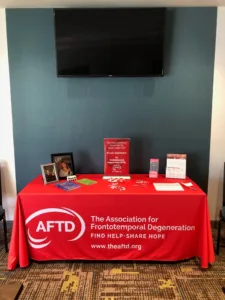Volunteer Update: Hosting a Meet & Greet Event

By hosting a Meet & Greet on behalf of AFTD, volunteers can bring together people affected by FTD in their local area and neighboring communities to share resources and support for the FTD journey ahead.
At a November Meet & Greet hosted by AFTD Ambassador Sandra Gonzalez-Morett and AFTD volunteer Veronica Wolfe, attendees shared their diverse experiences and provided mutual support. In addition to discussing experiences and exchanging insights, attendees were able to take home helpful AFTD resources.

Attendees of the event held by Sandra Gonzalez-Morett and Veronica Wolfe
Meet & Greets also provide the opportunity for people affected by FTD to find greater understanding of what they are going through. AFTD Ambassador Dawn Kirby told Help & Hope about a Meet & Greet she hosted in August and the difference it made to a husband and wife who attended. The wife had been recently diagnosed with “early-onset dementia” after three years of struggling with misdiagnoses. The couple shared their experiences with Kirby, who understood their story from her own FTD journey, and received guidance on resources available through AFTD, such as diagnostic checklists that can be brought to a doctor’s appointment.
“The husband said it was refreshing to finally meet someone that ‘got it,’” Kirby told Help & Hope. “I felt so blessed to be able to share with them, but most importantly, to bring hope into their journey as they seek a proper diagnosis. They [shared the] information with their family as well as the neurologist in a large clinic in Indianapolis.”
How Does a Meet & Greet Work?
First, the AFTD volunteer coordinating the event must pick a good, neutral location for the meeting – past locations have included libraries, community centers, restaurants, and churches. In addition, the volunteer must pick a date and time (Meet & Greets typically last an hour and a half). Virtual events are also an option, but in-person events provide more powerful bonding moments, and more information tends to be shared.
Once the event has been arranged, volunteers receive assistance from AFTD to promote the event. AFTD will send an e-blast (and a one-week reminder) to all contacts within a 25-50–mile radius around the event. AFTD will also provide volunteers with a PDF flyer they can share on social media or print out to distribute in their community.
The main question that volunteers are likely to hear on the day of their event is, “What support is out there for FTD?” While providing emotional support is essential, the event aspires to equip attendees with the information and resources they need to make their next best step.
Volunteers can take some of the following steps to help attendees during their Meet & Greet:
- Connect attendees with AFTD resources, such as diagnostic checklists for different FTD disorders or Comstock Grants, which offer financial assistance. AFTD provides PowerPoint slides to volunteers to help highlight valuable resources and support.
- Tell attendees about local or national FTD support groups that they may be eligible to join. (While a Meet & Greet can be held to launch a new support group, meetings of support groups are separate events.)
- Open a discussion about different medical and logistical supports in the area. While one person’s solution might not work for everyone, sharing what worked can introduce attendees to other options for support in their community.
- Answer miscellaneous questions from attendees. Even as the host, however, you aren’t expected to know all the answers. Volunteers can always refer attendees to AFTD’s HelpLine, which is staffed by social workers with experience in FTD who can answer questions on the disease (1-866-507-7222 or info@theaftd.org).

The event table from Dawn Kirby’s August Meet & Greet – a handy way to share physical resources with attendees
A Meet & Greet is a unique opportunity for volunteers to help people on the FTD journey navigate the challenges of the disease and create new avenues for support for those who might have had none. It is essential for volunteers not to place their focus on charting out the entire FTD journey for attendees – instead, meet people where they are and help them make the next best step for their situation. This could involve resolving issues with getting a diagnosis, finding treatment options in the area, or helping to identify a fitting support group.
AFTD is always happy to welcome volunteers interested in bringing together people in their area who have FTD in their lives. Meet & Greets can be a turning point for people on the FTD journey, providing them with information and understanding that they might not have found otherwise. Countless people have benefited from meeting others who understand what FTD is like and have insights they could share. AFTD hopes that even more will learn that they don’t have to take the FTD journey alone.
Interested in volunteering with AFTD? Fill out our Volunteer Interest Form!
By Category
Our Newsletters
Stay Informed
Sign up now and stay on top of the latest with our newsletter, event alerts, and more…
